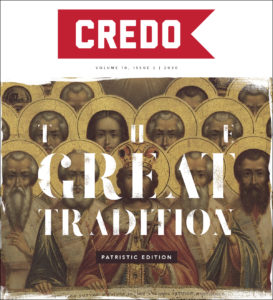Basil of Caesarea: He Need Only Live the Gospel
 The new issue of Credo Magazine, “The Great Tradition,” focuses on the early Church Fathers. The following is an excerpt from one of the issue’s featured articles by Stephen Hildebrand. Stephen Hildebrand (Ph.D., Fordham University) has taught at Franciscan University of Steubenville since 2001. His publications on St. Basil include St. Basil the Great, On the Holy Spirit (St. Vladimir’s Seminary, 2011), Basil of Caesarea (Routledge, 2018), and Basil of Caesarea (Baker Academic, 2014).
The new issue of Credo Magazine, “The Great Tradition,” focuses on the early Church Fathers. The following is an excerpt from one of the issue’s featured articles by Stephen Hildebrand. Stephen Hildebrand (Ph.D., Fordham University) has taught at Franciscan University of Steubenville since 2001. His publications on St. Basil include St. Basil the Great, On the Holy Spirit (St. Vladimir’s Seminary, 2011), Basil of Caesarea (Routledge, 2018), and Basil of Caesarea (Baker Academic, 2014).
Division in the Church, widespread doctrinal confusion and ignorance, a sometimes hostile government, a sexually permissive culture, scores of Christians marginally committed to the gospel, the suffering of the poor—these challenges that confront today’s pastors are the very ones that Basil of Caesarea faced. How did he handle them? What can we learn from him
Living the Gospel
The first thing to say is that Basil was not sufficiently attuned to the problems of his time before his own “conversion.” He was born into a serious Christian family and never strayed far, but he had his sights on a secular career. At the urging of his sister Macrina, who herself had decided to live a life strictly according to the gospel, Basil woke up, renounced his worldly ambitions, and dedicated himself to a life of prayer, penance, and contemplation. He made the Scriptures the center of his life, and strove to live a life completely in accord with its teaching. He drew up a set of texts from the New Testament together with short explanations and tried to live them out. The result, The Morals, was what one might call a rudimentary monastic rule. Here Basil sought the guidance of the gospel on every aspect of life: how to sleep, how to pray, how to dress, how to conduct oneself with others, superiors and colleagues, how to receive the sacraments, and how to counteract sin in oneself and in the community.
Living the gospel made Basil more sensitive to problems in the Church and in society and equipped him to make a contribution to their solution. Unlike many ascetics, Basil did not withdraw from the Church and the world but engaged them. He was ordained a presbyter to help the bishop of Caesarea and eventually became a bishop himself. As both a presbyter and a bishop he lived in community with others who likewise strove to live the evangelical life. They would regularly meet to address questions that arose about how they should apply the gospel to this or that issue, whether it be doctrinal, moral, or spiritual. Thus, these monastic conferences animated so much of Basil’s work.
Clearing up Trinitarian Doctrinal Confusion
We can see his efforts to clear up doctrinal confusion in this light. Both of his major polemical works, Against Eunomius and On the Holy Spirit, emerged from an ascetic context. The monks were deeply concerned with the question of the divinity of the Son and of the Spirit—nothing was more natural for them than to seek to know accurately the God of their longing. Eunomius had cut off access to the Father when he taught that the Son was a creature, and the Spirit-Fighters, who had denied the divinity of the Holy Spirit, destroyed our connection with the Son and the Father. In both cases, they made genuine communion with God impossible, for if the Son and the Spirit were outsiders to this communion, then so must we be. These works of Basil are little more than a refutation of his opponents’ interpretation of Scripture and his own attempt to articulate Scripture’s teaching. Basil—and he was not unique in this—saw these trinitarian mistakes as catastrophic. Click To Tweet
While his method is complex as it gets worked out in argument after argument, it rests on some very simple foundations. Both Eunomius and the Spirit-Fighters fixate on a few texts and fail to take a wide reading of Scripture. They ignore some key texts, and so fail to achieve an interpretation that does justice to the whole teaching of Scripture. The Eunomians, for example, hit on Acts 2:36, “God made him Lord and Christ” but fail to appreciate Jn. 14:9, “He who sees me sees the Father.” The Spirit-Fighters argued that the Holy Spirit must be inferior because he is a gift (e.g., Acts 2:38), and the gift cannot be equal to the giver, but Basil offers text after text whose force they ignore. Basil did not see his more balanced reading of the Scriptures as something fundamentally new. Rather, such a reading was demanded by the Christian tradition that he received and wished to hand on.
Fighting Against Trinitarian Catastrophes
While Basil’s thoughts on the Trinity have their origin in an ascetic context, he engaged doctrinal issues outside this context, too. He wrote letters, for example, to well-placed civil authorities and to fellow bishops, such as Apollinaris of Laodicea, St. Athanasius of Alexandria, and Pope Damasus of Rome. These letters give a detailed sense of how Basil saw the doctrinal controversy that began before he was born and ended, in spite of his efforts to resolve it, after he died. Essentially, Basil saw the truth in this case as the mean between two extremes.
On the one hand, Arius and like-minded figures who subordinated the Son to the Father (and the Spirit to the Son) commit two profound mistakes. First, they make the Son less than the Father. Secondly, they held, essentially, that there are three gods who are one not in substance but in agreement.
On the other hand, there were the “Sabellians” or “Photinians,” what we moderns call “modalists.” These bishops made the opposite mistake: they certainly taught one God but they failed to teach a distinction of persons. For them, Father, Son, and Holy Spirit name different modes of being of the one God, different personas, if you will, rather than different persons.
Basil—and he was not unique in this—saw these trinitarian mistakes as catastrophic. In the first case, the true God remains a monad unknowable and unreachable even by the Son himself, and if the Son cannot know the Father, then he cannot make us to know the Father or to participate in his life. The offer of the gospel has been emptied. In the second case, too, there is no inner divine life, no communion of persons, which Jesus reveals to us and opens for our participation.
So how can we avoid these two mistakes? Basil would have rathered people such as Arius simply read the clear teaching of Scripture aright, but because they did not, it became necessary to, as it were, fill out the teaching of the Scripture to make it clearer and more precise (or at least more precisely expressed). This was Basil’s view of the Creed of Nicaea of 325. The Council Fathers attempted to correct Arius by using a word that the Scriptures did not use (“consubstantial”) in order to preserve the true teaching of Scripture. Of course, the Council did not end the controversy over the status of the Son; instead “consubstantial” itself became part of the controversy. The problem here, as Basil saw it, was that the Council of Nicaea refuted Arius’s mistake but without also refuting the mistake of the modalists. Indeed, the thought that “consubstantial” by itself was open to a modalistic interpretation. He may well have been right about this, since one of the bishops who signed the creed of Nicaea was the most infamous fourth-century modalist, Marcellus of Ancyra. It was not sufficient for doctrinal peace and clarity that Marcellus himself renounced his mistake in the 340s and established communion with Athanasius of Alexandria. What was to be done?
**Read the remainder of Stephen Hildebrand’s article in the latest issue of Credo Magazine

